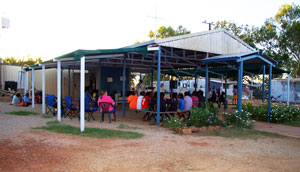'You mob out there, do you support them in these promises?' With these words, the Bishop of the Northern Territory, Greg Thompson, concluded a confirmation service of seven new indigenous Christians in the town of Ngukurr along the Roper River in the Top End.
The sun had long gone down. People from the community had gathered to witness the service, held under the stars outside the Anglican Church's Fellowship Hall in the centre of the town. The crowd included local families with their children, government and community workers, CMS missionary Pete Berthon, and a small mob of us from Sydney, include Rev. Phil Wheeler from Gladesville.
Ministry in the NT is tough. During the wet season from November to early May, communities are isolated with roads cut by raging torrents. It is stiflingly hot during these months. Crocodiles patrol the river. Despite the Government Intervention (now called 'Closing the Gap') and the work of many locals, communities still struggle with health issues, poor housing, gambling, substance abuse and violence. Poor literacy levels means that many indigenous adults struggle to read as a basic daily function, before they even get to the Bible.
Photo: A fellowship meeting at the Minyerri Anglican Church, south-east of Katherine in the Top End 
The only shop in Ngukurr sells a large range of high fat, high salt, high sugar and highly processed foods. Many communities only have one shop in their town, so people are very dependent on what is placed on the shelves by management. With the prevalence of diabetes among Aboriginal people, I stare in astonishment at a whole refrigerator devoted to frozen Sara Lee desserts. Why are so many people walking around with bottles of Coke? Some remote communities have actually stopped the sale of soft drinks, which is a good move. Soft drink companies should also take the initiative and stop selling their products to these stores. A submission to a Senate Committee in May 2009 made by the Roper Gulf Shire claimed that the quality and range of foods had improved since the 'imposed management' of stores. If this is an improvement, things must have been very bad indeed.
Churches struggle under these many burdens, but the indigenous leadership is enthusiastic, and lives are being changed by the gospel. There is a need for more Bible training in communities. Prayer is needed for their ministry. Leaders need support in their advocacy and pastoral efforts. Resources are required to raise up a new generation of lay and ordained gospel workers. Financial resources are needed to sustain the high cost of ministry in remote areas.
This sounds like the needs of many churches, but in the Territory, the problems of ministry are compounded by vast distance and physical obstacles, a complex community fabric and intractable social problems. If that doesn't sound like a missionary diocese, I don't know what does.
(Dr Karin Sowada and the Rev Phil Wheeler (representing the Anglican Deaconess Institution Sydney Limited), accompanied by their respective spouses Mr Armon Hicks and Dr Jill Wheeler, visited Darwin, Minyerri and Ngukurr from May 9 to 15)



























